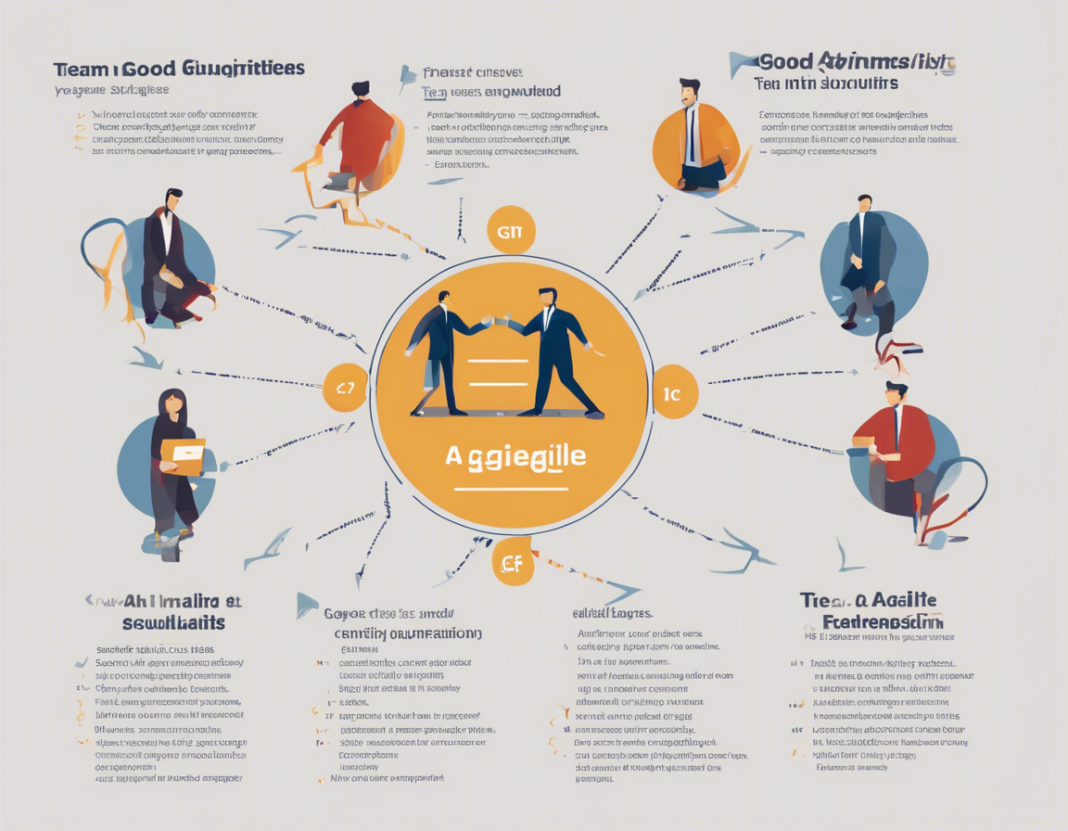In the realm of software development and project management, Agile methodologies have gained significant popularity in recent years. Agile emphasizes adaptive planning, evolutionary development, early delivery, and continuous improvement. Central to the success of Agile frameworks like Scrum, Kanban, and Extreme Programming is the collaborative effort of an efficient Agile team.
What are the key traits that make an Agile team efficient?
Collaboration
Collaboration is the cornerstone of Agile development. Team members work closely together, communicating regularly and openly sharing their knowledge and ideas. This results in a collective ownership of the project and fosters a sense of teamwork that is essential for success.
Adaptability
In the Agile world, change is inevitable. An efficient Agile team embraces adaptability and responds quickly to changing requirements, feedback, and priorities. They are open to making adjustments as needed to deliver value to the customer.
Empowerment
An efficient Agile team is empowered to make decisions and take ownership of their work. They have the autonomy to self-organize, decide how best to approach tasks, and continuously strive for improvement.
Continuous Improvement
Continuous improvement is at the core of Agile methodologies. An efficient Agile team is committed to learning from their experiences, both successes, and failures. They regularly reflect on their processes and find ways to enhance their performance.
Focus on Delivering Value
The primary goal of an Agile team is to deliver value to the customer. An efficient team prioritizes tasks based on their importance to the end-user and focuses on completing them in a timely manner.
Transparent Communication
Transparent communication is crucial for an Agile team to function efficiently. Team members openly share information, provide regular updates on their progress, and address any issues or concerns that may arise.
Respect
Respect for each team member’s expertise, opinions, and contributions is essential for the smooth functioning of an Agile team. An efficient team respects diversity and leverages the unique strengths of each member to achieve common goals.
Accountability
Each member of an efficient Agile team is accountable for their commitments. Team members take ownership of their tasks, meet deadlines, and ensure that the quality of the work meets the required standards.
Iterative Approach
Agile methodology emphasizes an iterative approach to development. An efficient Agile team breaks down projects into manageable increments, regularly reviews their progress, and incorporates feedback to make incremental improvements.
Embracing Feedback
Feedback is a valuable tool for the growth and success of an Agile team. An efficient team embraces feedback from team members, stakeholders, and end-users to make necessary adjustments and deliver a product that meets the needs of the customer.
Time Management
Efficient Agile teams excel in time management. They prioritize tasks effectively, estimate work accurately, and ensure that they meet deadlines without compromising on quality.
Adaptability to Change
Change is a constant in Agile projects, and an efficient team embraces change. They are flexible in their approach, willing to pivot when necessary, and continuously adapt to evolving requirements.
Strong Leadership
An efficient Agile team benefits from strong leadership that provides guidance, support, and motivation. A good leader empowers team members, facilitates collaboration, and ensures that the team remains focused on achieving its goals.
Cross-Functional Skills
An efficient Agile team comprises cross-functional members with a diverse set of skills and expertise. This allows the team to tackle a variety of tasks independently and reduces dependency on external resources.
Celebrating Successes
Acknowledging and celebrating successes is essential for boosting team morale and motivation. An efficient Agile team recognizes and appreciates the efforts of its members, fostering a positive and rewarding work environment.
Sustainable Pace
An efficient Agile team maintains a sustainable pace of work, avoiding burnout and ensuring long-term productivity. They understand the importance of work-life balance and prioritize the well-being of team members.
By embodying these key traits, an Agile team can operate efficiently, deliver high-quality products, and adapt to the dynamic nature of software development projects effectively.
Frequently Asked Questions (FAQs)
-
What is Agile methodology?
Agile methodology is an iterative approach to project management and software development that emphasizes flexibility, collaboration, customer feedback, and continuous improvement. -
What are the main principles of Agile methodology?
The main principles of Agile methodology include customer satisfaction, embracing change, delivering working software, collaboration, and responding to change. -
What is the role of a Scrum Master in an Agile team?
A Scrum Master in an Agile team is responsible for ensuring that the team follows the Scrum framework, facilitates meetings, removes obstacles, and helps the team achieve its goals. -
How does Kanban differ from Scrum in Agile project management?
Kanban and Scrum are both Agile methodologies, but Kanban focuses on visualizing work in progress and optimizing flow, while Scrum is based on fixed-length iterations and specific roles and ceremonies. -
How can Agile teams handle conflicts within the team?
Agile teams can handle conflicts by fostering open communication, encouraging respectful dialogue, addressing issues promptly, and seeking consensus on resolutions. -
What are some common pitfalls to avoid in Agile project management?
Common pitfalls to avoid in Agile project management include inadequate stakeholder involvement, poor communication, lack of prioritization, scope creep, and failure to adapt to change. -
How important is retrospective in Agile project management?
Retrospective is crucial in Agile project management as it allows teams to reflect on their processes, identify what went well and what could be improved, and make actionable changes for future iterations. -
What is the difference between Agile and Waterfall project management methodologies?
The Waterfall methodology follows a sequential approach to project management, while Agile is iterative and flexible, allowing for incremental development, continuous feedback, and adaptation to changing requirements. -
How can Agile teams maintain motivation and engagement over long projects?
Agile teams can maintain motivation and engagement by setting clear goals, providing regular feedback, celebrating achievements, fostering a positive team culture, and promoting a sense of ownership and autonomy. -
How can Agile principles be applied outside of software development?
Agile principles can be applied to various industries and projects outside of software development by promoting collaboration, adaptability, customer focus, continuous improvement, and iterative development to achieve desired outcomes efficiently.






